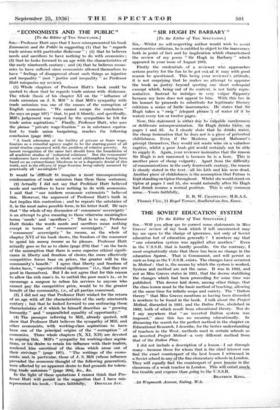"ECONOMIST'S AND THE PUBLIC ". - [To - the-Editor of THE -SPECTATOR.)
Snt;-,—Professor Hutt says that I have misrepresented his book Economists and the Public in suggesting (1) that he " regards
trade -unions with particular disfavour" ; (2) that he believes needs and sacrifices to have nothing to do with economics ;
(8) that he looks forward to an age with the characteristics of the early nineteenth -century ; and {4) that he believes econo- mies to have suffered since economists allowed themselves to have "-feelings of disapproval about such things as injustice and inequality " (not " justice and inequality "- as Professor
Hutt misquotes my review). _ (1.) Whole chapters of Professor Hutt's book could' be
quoted- to show that he regards trade-uniont with disfavour. The whole thesis of his chapter XI on the " influence of . trade. unionism on J. S. Mill " is that Mill's sympathy with
trade unionism was one of the causes of the corruption of English economics. " We cannot escape the conclusion " (he says on page 197) " that, to put it bluntly, and specifically, Mill's judgement was warped by the sympathies he felt for trade union aspirations." Finally, Professor Hutt, who uses the phrase " private wage-fixation " as in substance equiva- lent to trade union bargaining, reaches the following conclusion (page 202) :
" A frank admission of the futility of private or State wage- fixation as a remedial agency ought to be. the starting-point of all social studies concerned with the problem of relative poverty. An honest recognition of the same fact should form the foundation of all acadeinic studies of ' industrial relations.' But the economists' weaknesses have resulted in whole social philosophies having been based on an extraordinary blindness to or a dogmatic denial of this truth, and is the efficacy of wage-fixation being calmly assumed by
practically all socielogisti 53' - ' - It would be difficult to imagine tincompromising
condemnation of trade unionism thantheie throe sentenctk (2)- Actually I did not say that ProfeilsOi Hutt belieVed needs and sacrifices to have nothing to do with economics. I said that '"•our iniStlern economic extremists " believed this. HovieVer, the arginnent of Professor Hutt's boiik in fact implies this contention ; and-he repeats the substance of
it, in the most naive possible form; in his letter itself. Ile'says that " the whole Of my dismission Of ' consumers' sovereignty ' is an attempt to give meaning to those 'otherwise Meaningless terms `needs' and ' sacrifices '. " That is to say, Professor Hutt thinks the words needs and sacrifices mean nothing except in terms - of " consumers' sovereignty." And by " consumers' sovereignty " he means, as the , whole of chapter XVI of his book shows, the freedom.of the consumer to spend his money income as he pleases. Professor Hutt actually goes so far as to claim (page 270) that " on the basis of the assumption that there is some superior ethical signifil canoe in liberty and freedom of choice, the more effectively competitive forces bear on prices, the greater will be the community's benefit." I agree .that liberty and freedom of choice have, " superior ethical significance " (i.e., that they are good in themselves). But I do not agree that for this reason to allow the rich man's 5s. to outbid the poor man's is., oF to encourage a surgeon to .refuse his services to anyone who cannot . pay the competitive price, would be to the greater benefit of the community, i.e., of all parties concerned..
. (4.1 dici.nnt say that Profowor,Hatt wished for the return. of an age With all.the characteristics, of the early nineteenth century ; but that, he looked forward to one embracing those characteristics of it which he himself describes as " growing humanity " and " unparalleled equality of, opportunity."
(4) The passages referring to Mill, -already quoted, will show that Professor Hutt believes the sympathy of Mill, and other economists, with working-class aspirations to have been one of the principal origins of the " corruption " of economics. Three whole chapters (X, XI, XII) are devoted
to arguing this. Mill's " sympathy for working-class aspirts- tions, or his' desire to-retain his influence with their. leader&
rendered him uncritical of the ideas which arose out of their strivings " (page 197). - " The writings of the econo- mists, and, in particular, those of J. S. Mill (whose influence pervaded the economic 'thought of the following generation); were affected by an apparent desire to find grounds for tolera- ting trade unionism" (page 204), &c., &c.
In the light 'of these- quotations I cannot think that Pro-, fessor Hutt will persist in the suggestion that I have mis-
represented his book.—Yours *faithfully, Douor..As JAY.


















































 Previous page
Previous page